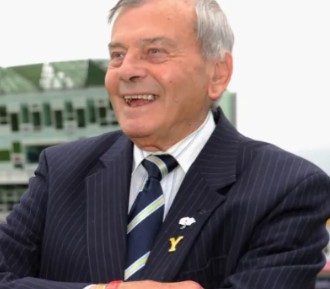Distinguished Cricket Umpire Dickie Bird Passes Away at 92
Harold “Dickie” Bird, a name etched in cricket folklore, embodied the spirit of the game through his distinguished career as both a player and, more prominently, an umpire. From his early days as a promising batsman for Yorkshire, where he crafted a respectable first-class record including two centuries, to his later transformation into one of the most recognizable figures in the umpiring world, Bird’s journey was marked by dedication, a unique personality, and an unwavering love for cricket. His playing career, though ultimately curtailed by injury at Leicestershire, provided the foundation for his remarkable second act, one that would see him officiating in some of the most iconic matches in cricketing history, including three World Cup finals.
Bird’s umpiring style was as distinctive as his Yorkshire roots. His anxious adherence to timekeeping, exemplified by the humorous anecdote of him attempting to scale The Oval’s walls before dawn, became a hallmark of his persona. He was known for his reluctance to give batsmen out leg before wicket (LBW), a characteristic that might have been challenged by the modern technology of the Decision Review System (DRS) but which, at the time, reflected a consistent, if perhaps overly generous, approach to adjudication. This leniency, however, seemed to momentarily disappear in his final Test match, where, after a touching guard of honour, he promptly dismissed Mike Atherton LBW in the very first over, a decision that added another layer to the rich tapestry of Dickie Bird stories.
Beyond the technical aspects of umpiring, it was Bird’s idiosyncrasies and his genuine love for the game that endeared him to players and fans alike. His decision to halt play due to excessive sunlight reflecting off a greenhouse, a testament to his unconventional approach, became a classic example of his unique interpretations of the rules. The infamous “lost marbles” incident, where the marbles he used to count deliveries went astray, further cemented his image as a lovable, slightly eccentric, and undeniably memorable figure in the game.
Dickie Bird was more than just an umpire; he was a character, a storyteller, and a living embodiment of cricket’s vibrant history. His interactions with players, often involving playful banter and practical jokes orchestrated by the likes of Ian Botham and Allan Lamb, showcased his ability to engage with the human side of the sport. The incident involving Lamb’s mobile phone, where Bird unknowingly became a messenger for a prank call from Botham, illustrates the light-hearted camaraderie he shared with the players, even amidst the pressures of international cricket.
Bird’s legacy extends far beyond the decisions he made on the field. He represented a bygone era of cricket, a time when personality and passion were as integral to the game as skill and strategy. His presence on the field was a reassurance, a symbol of the game’s inherent integrity and its ability to entertain and unite people from all walks of life. He was a storyteller, both on and off the field, and his anecdotes, often self-deprecating and humorous, painted a vivid picture of the personalities and events that shaped the cricketing world he inhabited.
Harold “Dickie” Bird’s passing marks the end of an era. He was more than just an umpire; he was an institution, a beloved figure who transcended the boundaries of the game and became a cultural icon. His name, synonymous with cricket itself, will forever be remembered with fondness and respect. His stories, from scaling The Oval’s walls to searching for his lost marbles, will continue to be recounted, ensuring that his spirit, his humor, and his unwavering passion for cricket live on in the hearts of fans for generations to come. He epitomized the human element of the sport, demonstrating that cricket is not just a game of bat and ball, but a rich tapestry woven with personalities, traditions, and the shared love of a timeless sport.
Share this content:












Post Comment